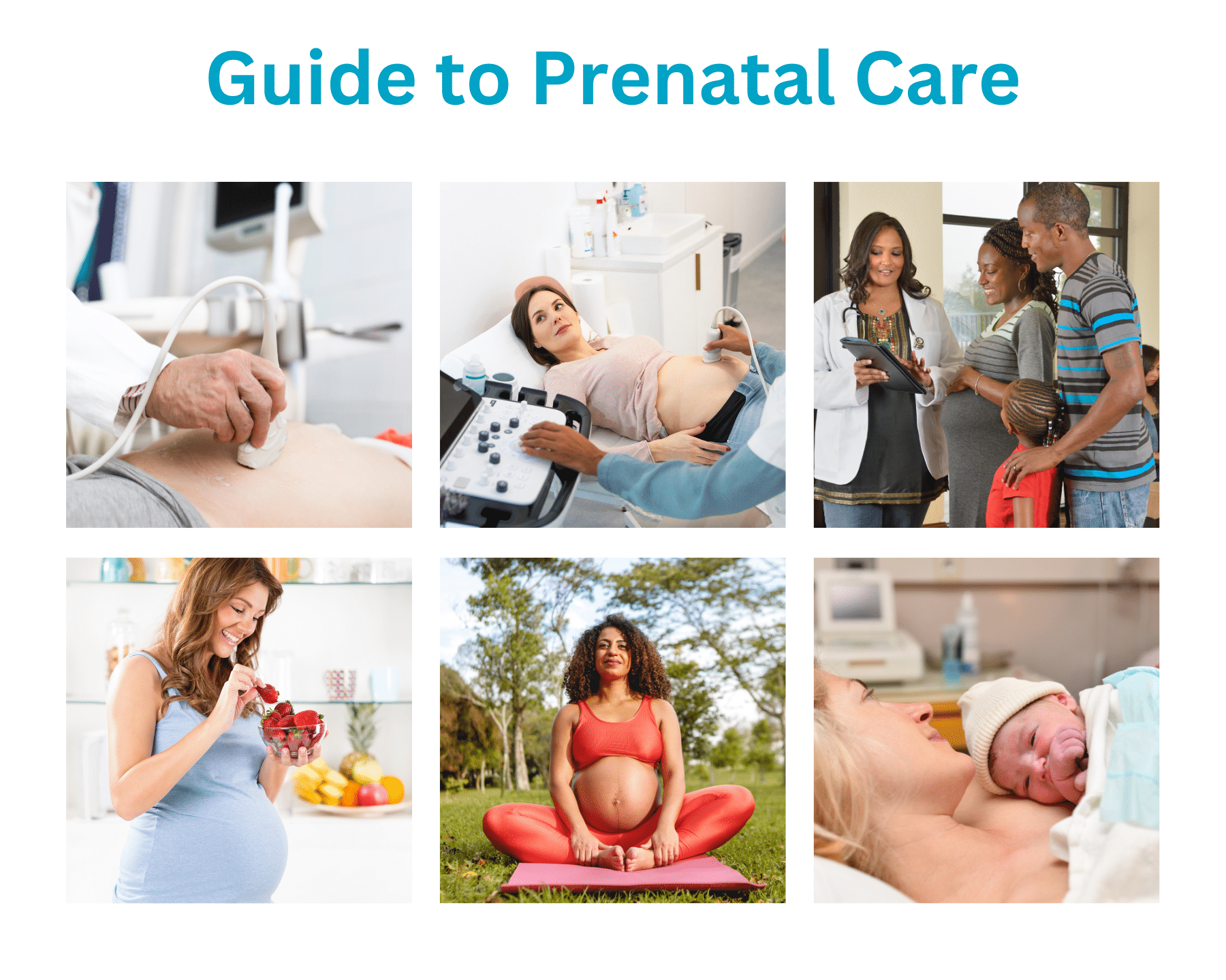Prenatal care essentials involves regular check-ups and screenings for pregnant individuals. This care ensures the health of both the mother and the baby.
Prenatal care is essential for a healthy pregnancy. It includes medical check-ups, screenings, and education about pregnancy, labor, and newborn care. Regular visits to a healthcare provider help monitor the mother’s health and the baby’s development. Early and consistent prenatal care reduces the risk of complications and promotes better outcomes for both.
Expectant mothers receive valuable information about nutrition, exercise, and what to expect during pregnancy. Engaging in prenatal care also allows for early detection of potential issues, ensuring timely interventions. By prioritizing this care, mothers can enjoy a healthier pregnancy journey, leading to a smoother transition into parenthood.

Credit: mediversehospital.com
Introduction To Prenatal Care
Prenatal care is crucial for a healthy pregnancy. It includes regular check-ups and screenings. Expecting mothers receive guidance on nutrition and wellness. Early and consistent care sets the stage for a healthy baby.
The Importance Of Early Pregnancy Care
Starting prenatal care early can help prevent complications. Here are some key benefits:
- Monitoring Health: Regular visits help track mom and baby’s health.
- Nutrition Advice: Experts provide tips for a balanced diet.
- Screenings: Detect potential issues early.
- Emotional Support: Address concerns and provide resources.
Research shows that early care leads to better outcomes for mothers and babies. Women who engage in prenatal care are more likely to have healthy pregnancies.
What To Expect In The Journey
The journey of prenatal care includes various stages:
- First Trimester: Initial check-up, blood tests, and ultrasounds.
- Second Trimester: Anatomy scan, weight monitoring, and glucose tests.
- Third Trimester: Final assessments, labor discussions, and birth plans.
Each visit is an opportunity to ask questions. Expect to discuss:
- Diet and exercise.
- Signs of complications.
- Labor and delivery options.
Staying informed and engaged enhances the experience. Remember, each pregnancy is unique.
First Trimester Checklist
The first trimester is a crucial time for expecting mothers. It sets the foundation for a healthy pregnancy. Use this checklist to ensure everything is on track.
Initial Doctor Visits
Schedule your first appointment with a healthcare provider. This visit is essential for your health and your baby’s health.
- Confirm your pregnancy through a urine or blood test.
- Discuss your medical history and any medications.
- Get advice on prenatal vitamins, especially folic acid.
- Ask about screening tests for genetic conditions.
Nutritional Adjustments
Nutrition plays a vital role in your pregnancy. Make smart choices to support your baby’s growth.
Focus on these key nutrients:
| Nutrient | Sources | Benefits |
|---|---|---|
| Folic Acid | Leafy greens, beans, fortified cereals | Helps prevent neural tube defects |
| Iron | Lean meats, spinach, lentils | Supports blood production |
| Calcium | Dairy products, tofu, almonds | Strengthens bones and teeth |
| Protein | Eggs, fish, poultry | Supports baby’s growth |
Stay hydrated. Drink plenty of water throughout the day.
Safe Exercise Habits
Staying active is important during pregnancy. It helps with mood and energy levels.
Consider these safe exercises:
- Walking
- Swimming
- Yoga
- Prenatal exercise classes
Avoid high-impact activities. Listen to your body. Rest as needed.
Understanding Prenatal Vitamins
Prenatal vitamins are crucial for a healthy pregnancy. They provide essential nutrients for both mother and baby. Taking the right vitamins can support fetal development. Understanding these vitamins helps in making informed choices.
Key Nutrients And Supplements
Prenatal vitamins contain key nutrients that support pregnancy. Here are the most important ones:
| Nutrient | Benefits |
|---|---|
| Folic Acid | Reduces risk of neural tube defects. |
| Iron | Prevents anemia and supports blood supply. |
| Calcium | Builds strong bones and teeth for the baby. |
| DHA | Supports brain and eye development. |
- Vitamin D: Aids calcium absorption for bone health.
- Vitamin C: Boosts immune health and iron absorption.
- Zinc: Supports cell growth and development.
Vitamin Myths Debunked
Many myths surround prenatal vitamins. Let’s debunk some common ones:
- Myth 1: All vitamins are the same.
- Myth 2: Prenatal vitamins cause weight gain.
- Myth 3: You can get all nutrients from food alone.
Prenatal vitamins are specially formulated for pregnant women. They contain higher levels of certain nutrients. Supplements are important for those with dietary restrictions. Consult a healthcare provider before starting any vitamin regimen.
Monitoring Your Health
During pregnancy, monitoring your health is vital. Regular check-ups help track your progress. They ensure both you and your baby stay healthy. Simple practices can make a big difference. Let’s explore two key aspects: tracking weight and blood pressure, and recognizing warning signs.
Tracking Weight And Blood Pressure
Keeping an eye on your weight and blood pressure is essential. These factors indicate how well you and your baby are doing.
| Week of Pregnancy | Expected Weight Gain | Normal Blood Pressure Range |
|---|---|---|
| 1-12 weeks | 1-4 pounds | 120/80 mmHg |
| 13-26 weeks | 5-10 pounds | 120/80 mmHg |
| 27-40 weeks | 11-20 pounds | 120/80 mmHg |
Use a scale to check your weight regularly. A steady weight gain is normal. Too much or too little weight gain can be concerning.
Monitor blood pressure at home. Use a digital blood pressure monitor. Normal readings help prevent complications. High blood pressure can lead to serious issues.
Recognizing Warning Signs
Stay alert for warning signs during pregnancy. Early detection can prevent complications.
- Severe headaches
- Vision changes
- Swelling in hands or face
- Severe abdominal pain
- Heavy bleeding
Contact your doctor if you notice any of these signs. Quick action is crucial for your health and your baby’s health.
Regular check-ups, weight tracking, and recognizing warning signs keep you on the right track. Stay proactive for a healthy pregnancy!
Prenatal Testing And Screenings
Prenatal testing and screenings are vital for a healthy pregnancy. These tests help monitor the baby’s development and detect any potential issues early. Expecting parents can make informed decisions through these assessments.
Routine Tests Explained
Routine tests are standard during prenatal care. They help ensure the health of both mother and baby. Here are some common routine tests:
- Blood tests: Check for anemia, blood type, and infections.
- Urine tests: Screen for diabetes and kidney issues.
- Ultrasound: Visualizes the baby’s development and checks for abnormalities.
- Glucose screening: Tests for gestational diabetes.
These tests typically occur at specific stages of pregnancy.
| Test | Timing | Purpose |
|---|---|---|
| Blood tests | First trimester | Check overall health and infections |
| Urine tests | Throughout pregnancy | Monitor kidney health and infections |
| Ultrasound | Second trimester | Check baby’s growth and anatomy |
| Glucose screening | 24-28 weeks | Detect gestational diabetes |
Optional Genetic Screening
Optional genetic screenings provide more information about the baby’s health. These tests assess the risk of genetic disorders. Some common genetic screenings include:
- Chorionic villus sampling (CVS): Done between 10-13 weeks.
- Amniocentesis: Performed after 15 weeks.
- Non-invasive prenatal testing (NIPT): Available as early as 10 weeks.
Each test has its benefits and risks. Discuss these options with your healthcare provider. Make the best choice for your pregnancy.

Credit: www.osmosis.org
Emotional Well-being During Pregnancy
Pregnancy is a beautiful journey, but it can also be challenging. Emotional well-being is crucial during this time. Hormonal changes can impact mood. Managing stress and anxiety is vital for both mother and baby. A positive mindset supports a healthy pregnancy.
Managing Stress And Anxiety
Stress and anxiety can affect your health. Here are effective ways to manage them:
- Practice relaxation techniques: Try deep breathing or meditation.
- Stay active: Regular exercise boosts your mood.
- Maintain a healthy diet: Nutrient-rich foods help improve mental health.
- Get enough sleep: Quality sleep is essential for emotional balance.
- Limit caffeine and sugar: These can increase anxiety levels.
Consider journaling your thoughts. Writing can help process emotions. Seek professional help if needed. Therapists can provide valuable support.
Support Systems And Resources
A strong support system makes a difference. Surround yourself with caring people. Here are key resources to consider:
| Resource Type | Description |
|---|---|
| Family and Friends | Emotional support from loved ones is invaluable. |
| Support Groups | Connect with others experiencing similar feelings. |
| Online Communities | Join forums for shared experiences and advice. |
| Healthcare Providers | Consult doctors for guidance on mental health. |
Don’t hesitate to ask for help. Sharing feelings can lighten the emotional load. Remember, you are not alone on this journey.
Preparing For The Baby’s Arrival
Preparing for your baby’s arrival is an exciting journey. This process includes gathering essential items and setting up a comforting space. Focus on creating a safe and welcoming environment for your new family member.
Essential Baby Gear
Gathering the right baby gear is crucial. Here is a list of must-have items:
- Crib: A safe sleeping space is essential.
- Car Seat: Needed for safe travel.
- Diapers: Stock up on both cloth and disposable.
- Clothes: Choose soft, comfortable fabrics.
- Swaddles: These help babies feel secure.
- Baby Monitor: Stay connected to your little one.
- Feeding Supplies: Bottles and breast pumps may be necessary.
Setting Up The Nursery
Creating a nursery is a fun project. Keep these tips in mind:
- Choose a Safe Location: Select a quiet room away from noise.
- Pick Calming Colors: Soft pastels promote relaxation.
- Organize Essentials: Keep diapers, clothes, and blankets close.
- Add Personal Touches: Include family photos or artwork.
- Ensure Proper Lighting: Use dimmable lights for nighttime feedings.
Consider using a table for organization:
| Item | Purpose |
|---|---|
| Changing Table | Convenient diaper changes |
| Rocking Chair | Comfort during feedings |
| Storage Bins | Keep toys and clothes organized |
These preparations ensure a smooth transition into parenthood. Make each decision count. Your baby’s comfort and safety come first.

Credit: www.pbmchealth.org
Birth Plans And Delivery Options
Creating a birth plan helps expectant parents express their wishes. It outlines preferences for labor and delivery. Understanding delivery options is essential for informed decisions.
Choosing A Birth Setting
Choosing the right birth setting is crucial. Options include:
- Hospital: Provides immediate medical care.
- Birthing Center: Offers a homelike environment.
- Home Birth: Allows for comfort in familiar surroundings.
Consider the following factors:
| Factor | Hospital | Birthing Center | Home Birth |
|---|---|---|---|
| Medical Equipment | Fully equipped | Basic equipment | Limited equipment |
| Staffing | Obstetricians, nurses | Midwives, nurses | Midwives |
| Environment | Clinical | Homely | Personal |
Pain Management Techniques
Many pain management techniques are available. Common methods include:
- Medications: Epidurals, nitrous oxide, or IV pain relief.
- Natural Techniques: Breathing exercises and relaxation.
- Hydrotherapy: Using water for comfort.
- Massage: Helps relieve tension and pain.
Discuss these options with your healthcare provider. Choose what feels right for you.
Postpartum Care
Postpartum care is essential for new mothers. This period focuses on recovery and adjustment after childbirth. Proper care helps mothers heal physically and emotionally.
Recovery After Childbirth
Recovery after childbirth involves both physical and emotional aspects. Here are key points to consider:
- Physical Healing: Expect some pain and discomfort. Rest as much as possible.
- Pelvic Floor Exercises: Strengthen muscles with Kegel exercises.
- Nutritional Needs: Eat a balanced diet rich in vitamins and minerals.
- Hydration: Drink plenty of water to stay hydrated.
- Follow-Up Appointments: Schedule visits with your healthcare provider.
Emotional health is equally important. New mothers may face mood swings or anxiety. Seek support from family and friends.
If feelings of sadness persist, consult a professional. Mental health matters after childbirth.
Newborn Care Basics
Newborn care can feel overwhelming. Simple guidelines can help you navigate this new journey:
- Feeding: Feed your baby every 2-3 hours. Choose breastfeeding or formula.
- Diaper Changes: Change diapers frequently to avoid rashes.
- Bathing: Give sponge baths until the umbilical cord falls off.
- Sleep Safety: Place your baby on their back to sleep.
- Routine Check-Ups: Schedule regular pediatric visits.
Understanding your newborn’s cues is crucial. They communicate through crying and body language. Responding to their needs fosters a strong bond.
Postpartum care is vital for both mother and baby. It sets the foundation for a healthy family.
Frequently Asked Questions
What Is Prenatal Care?
Prenatal care involves regular check-ups during pregnancy to monitor health and development of both mother and baby.
Why Is Prenatal Care Important?
Prenatal care helps identify potential health issues early and ensures proper guidance for a healthy pregnancy.
How Often Should I See My Doctor?
Most women should schedule visits every month during the first 28 weeks, then bi-weekly until 36 weeks.
What Tests Are Done During Prenatal Visits?
Common tests include blood tests, ultrasounds, and screenings for genetic conditions and infections.
Can I Continue Working During Pregnancy?
Yes, most women can work throughout their pregnancy, depending on their health and job requirements.
What Should I Discuss With My Doctor?
Discuss any health concerns, symptoms, lifestyle changes, and nutritional needs to ensure a healthy pregnancy.
How Can I Prepare For My First Appointment?
Bring your medical history, list of medications, and questions about pregnancy to discuss with your healthcare provider.
What Lifestyle Changes Should I Make?
Focus on a balanced diet, regular exercise, avoiding harmful substances, and managing stress for a healthier pregnancy.
Conclusion
Prenatal care is vital for a healthy pregnancy. Regular check-ups help monitor both mother and baby’s well-being. Educating yourself about nutrition and lifestyle choices is equally important. Prioritizing prenatal appointments ensures that potential issues are addressed early. Embrace this journey with knowledge and support for the best outcomes for you and your baby.




